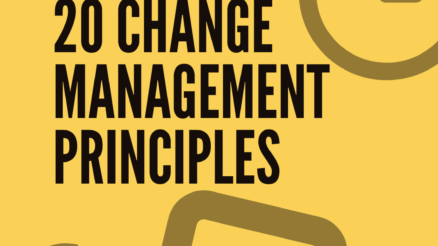People need support and guidance to overcome their fears about organizational change.
Its change leaders, managers, supervisors or change agents who provide this kind of support and assistance to people to take them through journey of change.
In this blog post, let’s explore more on change agent, its types, why he/she is important and role of change agent in organizational change.
Who is a Change Agent?
A change agent is an individual from inside or outside an organization who facilitates change process.
A change agent is a catalyst for change process and he is someone who inspires and influences people to make change happen.
A change agent motivates and persuades important individuals to make the required adjustments, such as changes in their desires, attitudes, and actions.
A change agent encourages and supports new ways of doing things, and is frequently regarded as a vital link between management and the rest of the employees.
Types of change agent
There are five types of change agent that include:
1. Internal change agents
An internal change agent is generally a team member who knows organizational culture, history and politics. Within their organizations, managers and senior executives are frequently expected to be change agents.
Change agents, on the other hand, aren’t limited to high-ranking employees. A change agent can be a lower-level employee with the ideal combination of skills, personality traits, and authority to guide others through the change.
2. External change agents
An external change agent is an outside professional or third-party change expert with relevant experience to drive change efforts.
They are exempted from company rules, laws, and policies, allowing them to thoroughly assess a variety of scenarios and provide appropriate change management models and techniques that can help in avoiding change failures.
3. People-focused change agents
Change agents who work with people to boost their morale and motivation are people-focused change agents. Their focus is to understand reasons of resistance of change and help employees to overcome their barriers of change and deal with change process.
They understand emotional reaction of employees on change and guide them to adopt with change. They also focus on reducing dissatisfaction, turn over and other negative outcome of change.
4. Organizational structure change agents
These change agents work to increase the overall efficiency of an organization’s structure. Organizational structure change agents employ a variety of analytical methodologies to understand structural gaps and identify loopholes in system.
Their focus is to improve organization’s structure and system through introducing technology and new policies and structures.
5. Internal process change agents
Internal processes such as intergroup interactions, communication, and decision-making are at the forefront of these change agents’ minds.
Internal process change agents use a cultural change method, which includes sensitivity training, team building, and employee surveys, to drive the change.
Why change agent is important?
A change agent is a proponent of the change who also acts as a link between leadership and the rest of the organization in a change initiative. Every organizational change, either big or small requires the involvement of one or more change agents.
A change agent, whether external or internal, possesses the skills necessary to lead and aid the change process and contribute to success of organizational change. .
Role of change agent in organization change
Every organization has different demands and requirements of a change project. So, role of change agent in organizational change may vary from one organization to another.
Some of the roles change agents could play while they try to influence change in an organization are:
1. Knowledge creator
The first and foremost role of a change agent is to create knowledge which helps other team members to take actions. For this purpose, change agent collect essential data and gather useful business insights and translate into action plan for his/her team members who are associated with change process.
Through creation of this kind of knowledge, change agent catalyse implementation of successful organizational change.
2. Trainer
A change agent frequently acts as a trainer to assist team members in acting on the insights and new knowledge. A change agent transfer those new skills that will prepare employee for the new digital or technological transformation.
The change agent’s function as a trainer is to encourage learning by teaching employees how to utilize data to initiate change.
3. Change Champion
A Change agent mobilizes individuals to support effort and encourage them to participate in change process. He/she also continues to beat the drum of change while everyone else. A change agent is vocal and champion of the purpose of change.
The role of change agent in organization change is to advocate change at every forum. This approach helps to overcome resistance to change and gather support and buy-in of all stakeholders of change.
4. Mediator
Change is a complex process. Employees usually have different priorities and understanding about change. This difference is one of causes of conflict at organization that is undergoing change.
It’s is primary role of change agent in organizational change is to mediate and resolve conflicts among team members. Therefor, change agents facilitate to make a cohesive team.
What makes a good change agent?
Senior managers are expected to be change agents in certain businesses, but they are unlikely to be effective unless they possess the necessary personal qualities.
Senior managers may also find it difficult to let go of their command and control management style and instead employ the influence and persuasion techniques associated with good change agents.
Staff members with the correct balance of abilities, expertise, and respect from their contemporaries should be identified in each area and employed as change agents in their respective areas of the company.
Each change agent should also be well enough in their field of work and how it fits into the larger company, as well as have great working connections with their coworkers.
The role of a change agent has become critical for organizations because failures in the change process can result in damaging losses and setbacks for the reputation of the company.
To become an effective change agent the following desirable characteristics must be present in that individual:
- Acknowledges the Vision
- Patient, yet persistent
- Demonstrates Leadership
- Enthusiastic and compassionate
- Good Negotiator and Strong Communicator
- Passionate and leads by example
- Easy to get on with and good at getting ideas over
- Organized and pragmatic
- Willingness to confront others with tough questions
- Innovative, flexible, and openness to new ideas
- Commitment and integrity
- Thorough understanding of business culture
- To work through uncertainty with comfort and ease
- Eagerness for new opportunities and fresh possibilities
Skills required for a change agent
A change agent must have a thorough understanding of the organization as well as other relevant fields. To be an effective change agent, he must be skilled in evaluative, diagnostic, and conceptual knowledge, as well as ethical knowledge.
The change agent must be versatile and willing to listen, recognize, trust, observe, and report back to the organization on his findings. A change agent must practice the same values that he promotes and encourage others to join in the change process.
Some of the skills that are required to be an effective change agent are:
- Change agents’ skills include the ability to form meaningful and long-term connections that are very essential.
- Logical abilities for self-awareness and evaluation
- Strong communication and extensive abilities that can quickly disperse the change information throughout the organization to recognize and implement the initiative
- A change agent must have the skill to prioritize his work and to build good relations with the individuals in the organizations that can lead to a successful change process
Final Words
Every organization that is implementing change initiative need change agent. The role of change agent in organizational change is very crucial. A change agent understands purpose of change and also he is able to drive entire change process by connecting with employees and stakeholders who matter most in this process. It’s important for every organization to take its change agents on board before kicking off its change initiative.



